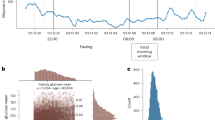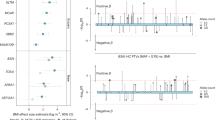Abstract
Human obesity is the result of both environmental and genetic factors. In this manuscript, we briefly review the metabolic factors predicting body weight gain in Pima Indians, a population prone to obesity. The metabolic predictors of weight gain are: 1) a low metabolic rate, 2) low levels of physical activity, 3) low rates of fat oxidation, 4) insulin sensitivity, 5) low sympathetic nervous system activity, and 6) low plasma leptin concentrations. In contrast, obesity is associated with high metabolic rate, high fat oxidation, low insulin sensitivity and high plasma leptin concentration. This observation emphasizes the need to conduct prospective studies to obtain a better understanding of the etiology of obesity. In addition, genetic studies will help to identify new pathways involved in the pathophysiology of obesity.
This is a preview of subscription content, access via your institution
Access options
Subscribe to this journal
Receive 12 print issues and online access
$259.00 per year
only $21.58 per issue
Buy this article
- Purchase on Springer Link
- Instant access to full article PDF
Prices may be subject to local taxes which are calculated during checkout
Similar content being viewed by others
Author information
Authors and Affiliations
Rights and permissions
About this article
Cite this article
Ravussin, E., Gautier, J. Metabolic predictors of weight gain. Int J Obes 23 (Suppl 1), S37–S41 (1999). https://doi.org/10.1038/sj.ijo.0800793
Published:
Issue Date:
DOI: https://doi.org/10.1038/sj.ijo.0800793
Keywords
This article is cited by
-
Influence of segmental body composition and adiposity hormones on resting metabolic rate and substrate utilization in overweight and obese adults
Journal of Endocrinological Investigation (2017)
-
Factors Predicting Nongenetic Variability in Body Weight Gain Induced by a High‐Fat Diet in Inbred C57BL/6J Mice
Obesity (2012)
-
Prospective association between fasting NEFA and type 2 diabetes: impact of post-load glucose
Diabetologia (2010)
-
β3-Adrenoceptor function and long-term changes in body weight
International Journal of Obesity (2009)
-
Gene–Nutrient and Gene–Physical Activity Summary—Genetics Viewpoint
Obesity (2008)



